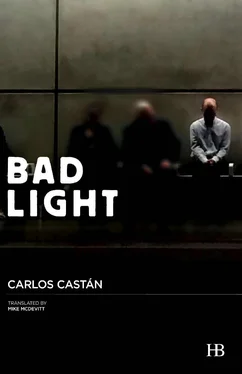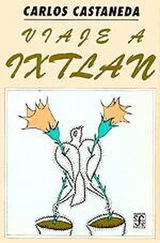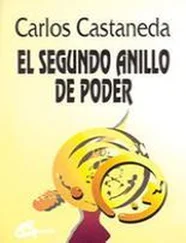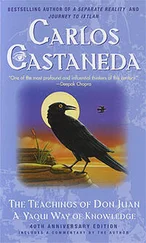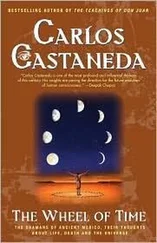Carlos Castán - Bad Light
Здесь есть возможность читать онлайн «Carlos Castán - Bad Light» весь текст электронной книги совершенно бесплатно (целиком полную версию без сокращений). В некоторых случаях можно слушать аудио, скачать через торрент в формате fb2 и присутствует краткое содержание. Год выпуска: 2016, Издательство: Hispabooks, Жанр: Современная проза, на английском языке. Описание произведения, (предисловие) а так же отзывы посетителей доступны на портале библиотеки ЛибКат.
- Название:Bad Light
- Автор:
- Издательство:Hispabooks
- Жанр:
- Год:2016
- ISBN:нет данных
- Рейтинг книги:5 / 5. Голосов: 1
-
Избранное:Добавить в избранное
- Отзывы:
-
Ваша оценка:
- 100
- 1
- 2
- 3
- 4
- 5
Bad Light: краткое содержание, описание и аннотация
Предлагаем к чтению аннотацию, описание, краткое содержание или предисловие (зависит от того, что написал сам автор книги «Bad Light»). Если вы не нашли необходимую информацию о книге — напишите в комментариях, мы постараемся отыскать её.
Carlos Castán
Bad Light
Bad Light — читать онлайн бесплатно полную книгу (весь текст) целиком
Ниже представлен текст книги, разбитый по страницам. Система сохранения места последней прочитанной страницы, позволяет с удобством читать онлайн бесплатно книгу «Bad Light», без необходимости каждый раз заново искать на чём Вы остановились. Поставьте закладку, и сможете в любой момент перейти на страницу, на которой закончили чтение.
Интервал:
Закладка:
I return from searching your apartment in the early hours of morning and then continue with the search of mine without pausing, throwing myself yet further into the task, as if among my things, as outlandish at it might seem, some of the answers to all of this might be found. And I forget about you. And I search my own bookshelves, the backs of my own drawers. I open dusty folders filled with old papers, with one corner folded down, that I can no longer identify. My military service ID and high school diploma even appeared from somewhere or other. I take another long hard look, one by one, at the photos I have for so long been reluctant to face, in search this time of some clue, retracing the steps of a life I have for some time now been unable to understand. Or that I have perhaps never truly understood but that now, for some reason that has to do with a padded coffin, absurdly upholstered in tulles and velvet, in which you lie, stitched up from head to toe like a rag doll, I need to understand in one way or another. It may not always be the case, but sometimes death (and I believe its imminence, proximity, or even a simple hint of it may suffice) illuminates everything. And it is precisely beneath that light when it becomes clear that there is nothing to see.
Cotton buds were placed in your nostrils and earholes, and some elderly women, aunts of yours if I understood correctly, drifted away from the window in which you were on display, commenting to one another that you were more handsome now than the last time they dropped by your apartment some months back to make sure you were coping. Less bloated, they say, what a difference, and as if more at peace, as different as night and day, without those wrinkled bags under the eyes that could make one shudder. Look, Jacobo, I don’t know much about detectives or police investigations. That’s never been my strong point. Even as a reader of fiction, as you well know, I’ve always had more of a French, melancholic bent, just as you liked to tease me about; I’ve always preferred an interior monologue over convoluted stories that unfold amid revolvers, bona fide clues and red herrings, enigmas and alibis. I almost always lose my bearings. I never fully understood The Big Sleep or L.A. Confidential , whether in book or movie form, to cite just a couple of examples of the ones we’ve discussed a thousand times. But one thing I will say despite it all, right now, here, in the midst of the silence spreading out from your casket and now strangling my throat: I am going to use every last living drop of what little remains hidden among the debris of my intelligence, no matter how ill it may seem, no matter how feeble, to make sure that it simply doesn’t end like this.
13 (still waters)
Things being as they were, and with the growing sense that everything around me was coming apart at the seams, I headed off to visit my mother at the old folks’ home in a bid to cross at least one item off the burgeoning list of minor regrets and unfinished business that has a habit of getting in the way of thought and even life when it grows too long for comfort. I’m not always able to visit my mother, and sometimes the simple fact is that I cannot summon up the energy. I’m not sure the extent to which she knows who I am any more, but there’s no doubt she’s pleased to see me. At least she looks proud whenever it’s her name, and not that of any of her fellow residents, that blares out on the megaphone that announces visitors from the scores of loudspeakers distributed along the hallways, and everyone, residents and nurses alike, the crazy and the sound of mind, busies themselves trying to find her in the rooms or among the hedges lining the garden paths. She feels important, which is why she always makes her appearance beaming triumphantly at all of her fellow inmates to whom no one has paid a visit that day as she makes her way to the room in which we sit. She proudly shows off her box of chocolates, her bottle of perfume. She shows me off. Some of the women remark on how tall I am, what a fine specimen I am. They ask my mother how many children I have, if I’m the eldest, if I live in Barcelona, questions she cannot answer. She answers yes to each one in turn and laughs happily, clinging tightly to my arm. For that alone, my visit is worthwhile.
I sit there watching her. It’s true, as everyone says, that we look alike, but even more so when she’s frightened. Then, we’re all but identical. The large bags under her eyes are the same ones I contemplate every morning in the bathroom mirror, a little more wrinkled, perhaps, but just as deep. It’s like a reflection of my own ruin, only grotesquely amplified, a bit like a verdict that this whole debacle of mine could be a lot worse than it already is and that the particular process of demolition in which I’m immersed continues unabated. It’s enough to let time go unhurriedly about its business. For the moment, I recognize the anguish in which she loses herself as my own, I can sometimes feel myself tumbling down slopes that are in her head, into wells that belong to her. With her walking stick, she roams these corridors that always smell of stale soup and used diapers, and she does so with my own weariness, much as I stagger through my days under the weight of hers on the other side of the ivy-covered walls. In my bones I can feel the weight she bears on her back, and I even sometimes walk on her aching legs, almost always rummaging around, just like her, among sunken memories. I think of my current confused state and these nerves writhing on top of one another within me as the small outpost of a dementia that belongs to her.
I know she’s going to tell me the same old stories. There hasn’t been much variety to her repertoire lately. Things from way back, from a time long since passed. I take a deep breath and resolve to be patient and to try and listen to those tales as if I were hearing them for the very first time. Sometimes she recounts them as a memory, and sometimes it’s as if we were still in the midst of that time. She takes me back to the streets of her childhood, which smell of wood and soapy water trickling down the gutters along the edge of the sidewalk, and once again tells me how she and her friends, in the games they played back then, liked to sneak into the houses in which a wake was being held, spurred on by a morbid dare. In the entrance to every house there stood a table covered in a black cloth, a book of condolences, and a silver platter bearing cards, one corner folded over as a token of mourning. The girls would climb the stairs, trembling on the inside, acting prim and proper and truly downcast until they reached the right floor. The door was always ajar. They might grab a cookie or two as they passed through the room, or a handful of sugar cubes, and as soon as they’d seen the body, they would sprint down the stairs, half-hysterical, doubled up with a laughter that was anything but light-hearted. They would never let a chance pass them by, and whenever they spotted the macabre signs in a doorway, a new game would begin in which none of the girls could be left behind. The game was cut short once and for all one winter afternoon on the Calle Padre Huesca when they discovered that the dead body lying on the bed belonged to a child their age. She still describes the scene as if she were seeing it now, the boy’s face so pale it was almost white, how dry his lips looked, the short trousers, the rosary beads in the clutches of stiff fingers with the cleanest, most neatly trimmed fingernails she had seen in her life. I think that what she’s getting at when she tells me all this is that, quite simply, one day her childhood came to an end for good, and it might well have been precisely that day.
One thing then leads to another, and she inevitably moves on to another of her old favorites: the Easter procession the year in which one of her classmates headed out with the brotherhood performing the Seven Words while brandishing a banner bearing the words I’m thirsty , and how that same classmate, just days later, drowned in the river, and what folks said, wavering between terror and jest, and the fear of laughter, and sorrow, for back then the incense that filled the air was still a smoke that arrived dense from the world of shadows, sent forth by a wrathful God who, though it might appear otherwise, took note of everything and sometime forgave and sometimes did not. This was during the same period when she was banned from taking to the streets to join the Procession of the Holy Burial during Holy Week, owing to the public disorder caused by the scenes of terror and the bloodcurdling screams from the balconies, the uproar and the charging throngs on the sidewalks, born of the popular belief, very firmly entrenched, that wherever the sinister float came to a halt to let the bearers catch their breath, someone would die that year. And she described to me the blade of that rusty scythe in the clutches of the skeleton vanquished and trampled underfoot by the angel, the scent of melted wax, the sparks that flew when the Romans’ spears scraped against the cobbled streets, the wailing of children, and the bare feet of the hooded penitents, their eyes deep behind the slits in the cloth like hidden, menacing animals, their black leather gloves, their bloodied ankles, the chains they dragged behind them as they walked. And the fear. Though she spoke to me of a time in which I had yet to be born, it was as if she were refreshing memories of my own, for the fact is I, too, have seen all of that, except for the famed Procession of the Angel of Death. My mother would not have us miss the Easter processions for anything in the world, which leads me to think that she considered that all that cowering, that fear she felt as a young girl perched on the edge of the Calle del Coso with her little bag of lupini beans, would in the long run do her children some good, almost as if she wished to offer us her very own nightmares, something about which she could later console us, thus making us more alike, bringing us closer together and causing us to need, just as she had begun to some years previously, to leave the light on in the hallway in order to be able to sleep. What she was looking to give us was a certain idea of intensity, much as when she told us bedtime tales of terror and abandonment. She was equipping us with all of the darkness we were unable to see with our own eyes and which, by contrast, made us appreciate all the more the daylight, the everyday household objects, the hours of tedium, the bowls of soup, the homework notebooks, the scent of soap on sheets and pillows, her own scent as she leant over our beds, just before switching off the light, to wish us goodnight, one by one, and sketch an invisible cross with her thumb on our foreheads. One cannot truly love a safe haven unless there are dark forces lurking outside, a world brimful of orphanages and tombs and beasts, of children who have gone hungry that night and a wind that howls as it whips around the corners in neighborhoods in which we had never set foot.
Читать дальшеИнтервал:
Закладка:
Похожие книги на «Bad Light»
Представляем Вашему вниманию похожие книги на «Bad Light» списком для выбора. Мы отобрали схожую по названию и смыслу литературу в надежде предоставить читателям больше вариантов отыскать новые, интересные, ещё непрочитанные произведения.
Обсуждение, отзывы о книге «Bad Light» и просто собственные мнения читателей. Оставьте ваши комментарии, напишите, что Вы думаете о произведении, его смысле или главных героях. Укажите что конкретно понравилось, а что нет, и почему Вы так считаете.
